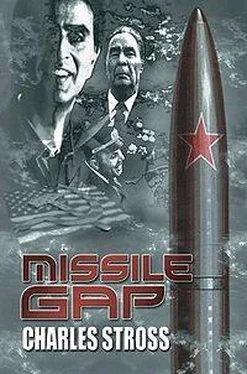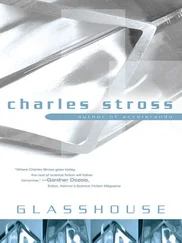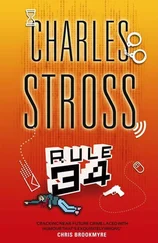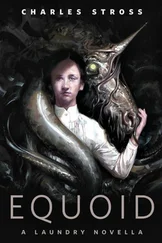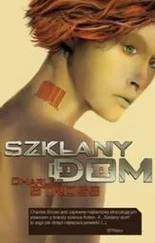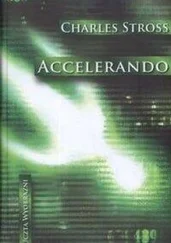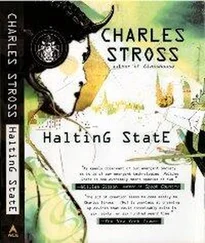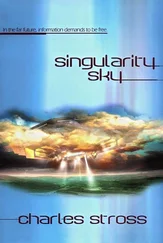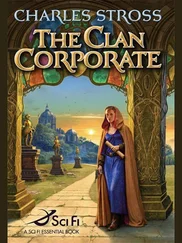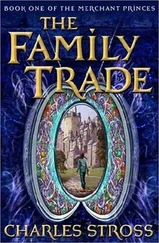"No, just the queen. None of these bugs are more than a month old."
The termites have stopped banging on the glass. They form two rows on either side of the stick, pointing their heads up at the huge, monadic mammals beyond the alien barrier. Looking at them closely Maddy notices other signs of morphological change: the increasing complexity of their digits, the bulges at the back of their heads. Is the queen's changing, too? She asks herself, briefly troubled by visions of a malignant intelligence rapidly swelling beneath the surface of the vivarium, plotting its escape by moonlight.
John stands behind Maddy and folds his arms around her. She shivers. "I feel as if they're watching us."
"But to them it's not about us, is it?" He whispers in her ear. "Come on. All that's happening is you've trained them to ring a bell so the experimenters give them a snack. They think the universe was made for their convenience. Dumb insects, just a bundle of reflexes really. Let's feed them and go back to bed."
The two humans leave and climb the stairs together, arm in arm, leaving the angry aboriginal hive to plot its escape unnoticed.
Chapter Seventeen: It's Always October the First
Gregor sits on a bench on the Esplanade, looking out across the river towards the Statue of Liberty. He's got a bag of stale bread crumbs and he's ministering to the flock of pigeons that scuttle and peck around his feet. The time is six minutes to three on the afternoon of October the First, and the year is irrelevant. In fact, it's too late. This is how it always ends, although the onshore breeze and the sunlight are unexpected bonus payments.
The pigeons jostle and chase one another as he drops another piece of crust on the pavement. For once he hasn't bothered to soak them overnight in 5% warfarin solution. There is such a thing as a free lunch, if you're a pigeon in the wrong place at the wrong time. He's going to be dead soon, and if any of the pigeons survive they're welcome to the wreckage.
There aren't many people about, so when the puffing middle aged guy in the suit comes into view, jogging along as if he's chasing his stolen wallet, Gregor spots him instantly. It's Brundle, looking slightly pathetic when removed from his man-hive. Gregor waves hesitantly, and Brundle alters course.
"Running late," he pants, kicking at the pigeons until they flap away to make space for him at the other end of the bench.
"Really?"
Brundle nods. "They should be coming over the horizon in another five minutes."
"How did you engineer it?" Gregor isn't particularly interested but technical chit-chat serves to pass the remaining seconds.
"Man-in-the-middle, ramified by all their intelligence assessments." Brundle looks self-satisfied. "Understanding their caste specialization makes it easier. Two weeks ago we told the GRU that MacNamara was using the NP-101 program as cover for a pre-emptive D-SLAM strike. At the same time we got the NOAA to increase their mapping launch frequency, and pointed the increased level of Soviet activity out to our sources in SAC. It doesn't take much to get the human hives buzzing with positive feedback."
Of course, Brundle and Gregor aren't using words for this incriminating exchange. Their phenotypically human bodies conceal some useful modifications, knobby encapsulated tumors of neuroectoderm that shield the delicate tissues of their designers, neural circuits that have capabilities human geneticists haven't even imagined. A visitor from a more advanced human society might start excitedly chattering about wet-phase nanomachines and neural-directed broadband packet radio, but nobody in New York on a sunny day in 1979 plus one million is thinking in those terms. They still think the universe belongs to their own kind, skull-locked social — but not eusocial — primates. Brundle and Gregor know better. They're workers of a higher order, carefully tailored to the task in hand, and although they look human there's less to their humanity than meets the eye. Even Gagarin can probably guess better, an individualist trapped in the machinery of a utopian political hive. The termites of New Iowa and a host of other Galapagos continents on the disk are not the future, but they're a superior approximation to anything humans have achieved, even those planetary instantiations that have doctored their own genome in order to successfully implement true eusocial societies. Group minds aren't prone to anthropic errors.
"So it's over, is it?" Gregor asks aloud, in the stilted serial speech to which humans are constrained.
"Yep. Any minute now—"
The air raid sirens begin to wail. Pigeons spook, exploding outward in a cloud of white panic.
"Oh, look."
The entity behind Gregor's eyes stares out across the river, marking time while his cancers call home. He's always vague about these last hours before the end of a mission — a destructive time, in which information is lost — but at least he remembers the rest. As do the hyphae of the huge rhizome network spreading deep beneath the park, thinking slow vegetable thoughts and relaying his sparky monadic flashes back to his mother by way of the engineered fungal strands that thread the deep ocean floors. The next version of him will be created knowing almost everything: the struggle to contain the annoying, hard-to-domesticate primates with their insistent paranoid individualism, the dismay of having to carefully sterilize the few enlightened ones like Sagan…
Humans are not useful. The future belongs to ensemble intelligences, hive minds. Even the mock-termite aboriginals have more to contribute. And Gregor, with his teratomas and his shortage of limbs, has more to contribute than most. The culture that sent him, and a million other anthropomorphic infiltrators, understands this well: he will be rewarded and propagated, his genome and memeome preserved by the collective even as it systematically eliminates yet another outbreak of humanity. The collective is well on its way towards occupying a tenth of the disk, or at least of sweeping it clean of competing life forms. Eventually it will open negotiations with its neighbors on the other disks, joining the process of forming a distributed consciousness that is a primitive echo of the vast ramified intelligence wheeling across the sky so far away. And this time round, knowing why it is being birthed, the new God will have a level of self-understanding denied to its parent.
Gregor anticipates being one of the overmind's memories: it is a fate none of these humans will know save at second-hand, filtered through his eusocial sensibilities. To the extent that he bothers to consider the subject, he thinks it is a disappointment. He may be here to help exterminate them, but it's not a personal grudge: it's more like pouring gasoline on a troublesome ant heap that's settled in the wrong back yard. The necessity irritates him, and he grumbles aloud in Brundle's direction: "If they realized how thoroughly they'd been infiltrated, or how badly their own individuality lets them down—"
Flashes far out over the ocean, ruby glare reflected from the thin tatters of stratospheric cloud.
"—They might learn to cooperate some day. Like us."
More flashes, moving closer now as the nuclear battlefront evolves.
Brundle nods. "But then, they wouldn't be human any more. And in any case, they're much too late. A million years too late."
A flicker too bright to see, propagating faster than the signaling speed of nerves, punctuates their conversation. Seconds later, the mach wave flushes their cinders from the bleached concrete of the bench. Far out across the disk, the game of ape and ant continues; but in this place and for the present time, the question has been answered. And there are no human winners.
